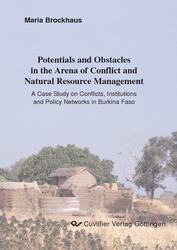| Areas | |
|---|---|
| Serie de libros (96) |
1380
|
| Nachhaltigkeit |
3
|
| Gesundheitswesen |
1
|
| Letra |
2371
|
| Medienwissenschaften | 16 |
| Teología | 57 |
| Filosofía | 102 |
| Derecho | 424 |
| Economía | 851 |
| Ciencias sociales | 419 |
| Ciencias del deporte | 48 |
| Psicología | 233 |
| Educación | 190 |
| Historia | 183 |
| Arte | 111 |
| Ciencias culturales | 166 |
| Literatur | 117 |
| Lingüística | 88 |
| Ciencias Naturales |
5408
|
| Ciencias Ingeniería |
1794
|
| General |
98
|
|
Leitlinien Unfallchirurgie
5. Auflage bestellen |
|
Erweiterte Suche
Potentials and Obstacles in the Arena of Conflict and Natural Resource Management (Tienda española)
A Case Study on Conflicts, Institutions and Policy Networks in Burkina Faso
Maria Brockhaus (Autor)Previo
Indice, Datei (24 KB)
Prologo, Datei (7,7 KB)
Lectura de prueba, Datei (37 KB)
In a period of environmental change, economic transformation and political uncertainty throughout West Africa, the problems of competition for and conflicts over natural resources are of growing concern. Farmer-herder conflicts are common and widespread. In the Southwest of Burkina Faso conflicts between ‘farmers’ and ‘herders’ are reported to be becoming more and more frequent and sometimes violent.
The study presented gives a comprehensive analysis of the arena of conflict and natural resource management in Burkina Faso. As a first step, the situation at local level, where conflicts occur and need to be managed, was analysed including the local institutional environment. A further step analysed the links between the local arena and the policy level, which determines the design and implementation of accompanying institutions and policies and therefore affects the local level.
An actor-oriented approach was chosen for the research. The basis of the research was a case study carried out by a multi-disciplinary team using PRA-techniques between October 2001 and June 2002 in six villages in the research area. This was followed by investigation of policy networks at the regional and national levels in Burkina Faso carried out between October 2001 and June 2003. The data was analysed by means of descriptive statistics and social network analysis.
Beside the `farmers’ and `herders’, different actors in the arena of conflict management were identified: local authorities (mediators); administration (local/regional as mediator, national as setter of frame condition); `politicians’, influencing decision-making processes at local as well as at national level; development projects and NGOs, supporting negotiation processes. Local-level solutions for management problems are preferred by nearly all informants and capacity building, due to its impact on sustainable and equitable land use planning and resource management, has been seen as a prerequisite. Although the actor groups pointed out their own potential roles e.g. as catalysts for negotiation processes, the ties between them, where they exist, are characterized by information gaps, hierarchical influence and distrust. Numerous obstacles to the fulfilment of their roles and those of others were listed by the actor groups. These obstacles included: actors’ lack of means and abilities; the state’s unwillingness to share power with the civil society; and the perceived abuse of power by powerful individuals in pursuit their personal interests. However, opportunities exist in the arena as broker for local interests or policy broker at national level could be identified, and due to the observed institutional dynamics and flexibility in the local arena. These potentials may allow a further movement towards peaceful and equitable mechanisms for conflict and natural resource management in Burkina Faso.
As recent decades have seen a shift from development assistance, which is project-based, to policy-based measures, the analysis of structures and paths, of holes, bridges, and brokers in specific policy areas is necessary to identify feasible policies and to support successful processes of change. Network analysis has the potential to deliver very relevant results for development policy analysis.
| ISBN-10 (Impresion) | 3865376452 |
| ISBN-13 (Impresion) | 9783865376459 |
| ISBN-13 (E-Book) | 9783736916456 |
| Formato | A5 |
| Idioma | Inglés |
| Numero de paginas | 216 |
| Edicion | 1 Aufl. |
| Volumen | 0 |
| Lugar de publicacion | Göttingen |
| Lugar de la disertacion | Gießen |
| Fecha de publicacion | 24.10.2005 |
| Clasificacion simple | Tesis doctoral |
| Area |
Ciencias sociales
|








